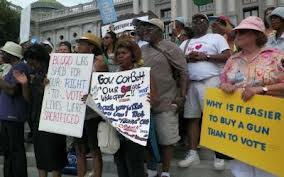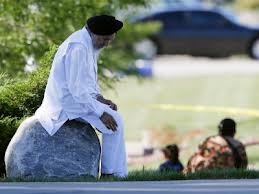 An old friend sent me a blog post from the Wall Street Journal today, noting that it was about the restriction of free speech. I’m not sure I agree that it is, or that what is discussed — the decision by several cities to not approve Chick-fil-a franchises — is an abridgement of freedom of speech.
An old friend sent me a blog post from the Wall Street Journal today, noting that it was about the restriction of free speech. I’m not sure I agree that it is, or that what is discussed — the decision by several cities to not approve Chick-fil-a franchises — is an abridgement of freedom of speech.
Chick-fil-a may do whatever it likes with its money, obviously. And no one (to my knowledge) is trying to stop that. What is happening is a boycott, an old & honoured way to say “I don’t buy this.” Conservatives have used it to great effect, as well: in Disney boycotts, against various anti-gay TV shows, etc. It’s not a liberal ploy :).
I don’t agree that the goal is to ‘buffalo voices into silence,’ as the post says, any more than I thought the mothers’ boycott of Penney’s for using Ellen de Generes as a spokesperson was a means of trying to silence Penney’s. The mothers didn’t want to support a company w/ a gay spokesperson. That is absolutely their right.
All we have, as consumers, is the power of our $$. That seems to be the only thing folks listen to these days: money. And the conclusions the blogger, McGurn, draws from the movement to protest various actions — even laws — disquiet me.
Unlike McGurn, I do believe that most (if not all) of the current voter ID laws are racist,  designed to drop the numbers of black, brown, and mixed race voters. I’m not the only one to think this, either. As I used to tell my students: don’t believe me; look it up.
designed to drop the numbers of black, brown, and mixed race voters. I’m not the only one to think this, either. As I used to tell my students: don’t believe me; look it up.
As for attempting to influence laws and legislators? Since when did participatory democracy — trying to influence our representatives to make laws that truly represent our ethics & moral imperatives — become an effort to ‘limit debate’? I want my vote to count, and I don’t want to elect representatives who believe antithetically to me. Unlike capitalism, participatory democracy affects everyone. The laws you, as my duly elected representative, pass will have life-long consequences for all of us. And to pretend that the half of the American public who disagree w/ either presidential candidate don’t exist is, at best, blind. At worst? It’s willful exclusion.
But back to Chick-fil-a: if you want to support anti-gay legislation and spending, that is absolutely your right. As it is mine to take my business elsewhere. There are, however, consequences to your actions.
It is not trying to change your opinion, or silence your voice, to boycott Chick-fil-a. It IS saying that I disagree strongly with their support of anti-gay groups, and will in no way support those actions. In other words? Your anti-gay actions will cost you. $$.
 In addition? When you are part of the hegemony — the majority, the visibly empowered mainstream — your rights rarely (if ever) need protecting. NO ONE is going to profile you — so you don’t need protection from profiling, but my daughter-in-law’s family does, and my cousin Sally’s grandchildren do. And when your religion is the majority, you are free to worship as you like. You are not threatened with violence as a Christian in the US. Muslims & Sikhs? They are. Therefore they need protection, and laws that help maintain the very precious freedom to worship that helped ground the very beginnings of this country. So I will continue to advocate to my representatives for laws that protect my gay niece, my brown daughter-in-law and her family, my cousin Sally’s grandchildren. And all the people like them.
In addition? When you are part of the hegemony — the majority, the visibly empowered mainstream — your rights rarely (if ever) need protecting. NO ONE is going to profile you — so you don’t need protection from profiling, but my daughter-in-law’s family does, and my cousin Sally’s grandchildren do. And when your religion is the majority, you are free to worship as you like. You are not threatened with violence as a Christian in the US. Muslims & Sikhs? They are. Therefore they need protection, and laws that help maintain the very precious freedom to worship that helped ground the very beginnings of this country. So I will continue to advocate to my representatives for laws that protect my gay niece, my brown daughter-in-law and her family, my cousin Sally’s grandchildren. And all the people like them.
As a stockholder, it is my RIGHT to protest a company’s policies, should I choose. It isn’t about silence: it’s about my right as an American, as a CAPITALIST, to question where my money goes, and how it’s being used. And as long as media is corporate owned — fewer than 5 companies own the vast majority of American media — I also want to know who’s backing what. ALEC isn’t being ‘dumped,’ in other words — despite McGurn’s protestations; it’s being outed. As the main force in pushing for for-profit charter schools, and trying to buy elections.
‘Unfashionable views’ are not what’s at risk here. It is the ability to go unchallenged for your beliefs, whatever they are. I will always challenge beliefs — religious or otherwise — that disenfranchise my friends & family. I will always refuse to pay for products that support those beliefs. I don’t see this as politically correct, or silencing the opposition. I see it as a dialogue where all that seems to ‘talk’ is my pocket book.
Do I wish we could talk in a face-to-face, civil conversation? Of course. But right now, money seems my only recourse…

